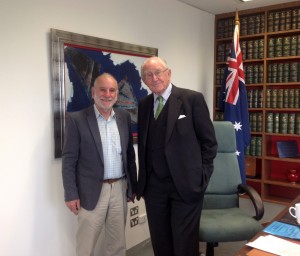Multicultural Victoria – 40 years of challenges and more to come

Eddie Micallef with ECCV Patron The Right Hon Malcom Fraser AC, former Prime Minister of Australia. Copyright: ECCV
Mental health, disability and employment are just some of the challenges facing Victoria’s ethnic communities, according to the
Ethnic Communities’ Council of Victoria (ECCV).
In an interview to mark 40 years of the organisation’s existence, ECCV Chairperson Eddie Micallef told AMES meaningful employment was a key to migrants’ health and wellbeing.
He said the ECCV, which has been instrumental in developing the strategy for multiculturalism in Victoria and Australia, continues to champion the struggles of ethnic communities.
“We need a lot of information and awareness-raising for people from NESB [Non English speaking backgrounds],” he said.
And he said unemployment is one of the major hurdles migrants need to overcome. “The key to people’s health and wellbeing is meaningful employment.”
Another barrier for migrants was the lack of recognition of overseas qualifications, Mr Micallef said.
“We’ve had a recent forum – Qualified but not Recognised – highlighting the underutilisation of migrants, refugees and asylum seekers, and skills that are not recognised.
“It’s challenging getting more and more of the mainstream, both government and private organisations to accept the fact that people from non-English speaking backgrounds have a very real potential to make a constructive impact on their respective organisations,” he said.
Bridging the gap between the needs of ethnic communities and government policy, ECCV promotes inclusiveness, tolerance and intercultural respect.
Mr Micallef said the ECCV played a key role in influencing the federal government to back down on proposals to water down the Racial Discrimination Act, which makes it illegal to offend, insult or humiliate a person based on their ethnicity.
“One of the great things about Victoria is that we have a bipartisan approach to multiculturalism,” Mr Micallef said.
He said Victoria led the way in terms of a broad policy agreement between all the major political parties.
“When you look around the world, even though we have problems, we’re doing a lot better than other countries,” he said.
“But that doesn’t mean we rest on our laurels,” Mr Micallef said.
The multicultural advocacy body this month celebrated its 40th anniversary with a gala dinner, with guests including Victorian Premier Denis Napthine, Minister for Multicultural Affairs and Citizenship Matthew Guy, Deputy Opposition Leader James Merlino.
Speaking at the dinner, Premier Denis Napthine congratulated the organisation for four decades of service and advocacy and said it was important to continue to build a multicultural Victoria.
He said multiculturalism in Victoria was a strength and added value to the state.
Dr Napthine quoted statistics which showed that 26 per cent of Victorians are born overseas and 47 per cent of Victorians are either born overseas or have at least one parent born overseas.
“I can announce that if the Coalition Government is re-elected in November, that the ECCV whose funding under the current arrangement ceases in July 2015, that not only we will continue that funding for another four year term but we’ll increase that funding by 25 per cent to $312,500 a year,” he said.
The message of the night was clear that multiculturalism must continue to be acknowledged by the government to build a healthier and brighter Australia.
Deputy Opposition leader James Merlino said multiculturalism used to be a policy but now it was simply a way of life.
“One reliable measure of policy success is when people stop referring to it as a policy, diversity is now our principle and our pillar,” Mr Merlino said.
In a video presentation, ECCV’s patron and former Prime Minister of Australia Malcolm Fraser praised the body’s continuous commitment in constructing and supporting a culturally diverse society.
Mr Micallef said he regarded cultural literacy as crucial in his vision of a multicultural Australia of the future.
He said intercultural skills not only bring people in touch with the global community, they bring what he deems ‘global smart talent’ into the workforce.
“Migration is no longer a one way process,” he said.
“People do transnational living … [they’re] born in one country, educated in another country, work in another country, then they are connected to all of those countries,” Mr Micallef said.












